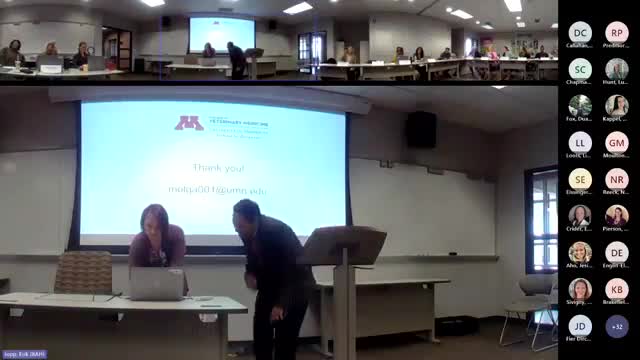Veterinary Leaders Address Workforce Shortages and Rural Health Challenges in Minnesota
April 03, 2024 | Board of Animal Health, Agencies, Boards, & Commissions, Executive, Minnesota

This article was created by AI summarizing key points discussed. AI makes mistakes, so for full details and context, please refer to the video of the full meeting. Please report any errors so we can fix them. Report an error »

Concerns over the veterinary workforce crisis took center stage at the Minnesota Board of Animal Health's Quarterly Board Meeting on April 3, 2024. Board members and stakeholders passionately discussed the urgent need for a paradigm shift to retain veterinarians, particularly in large animal medicine, as many graduates are leaving the profession shortly after entering.
One board member highlighted the challenges faced by rural veterinarians, emphasizing that financial burdens, such as student loans, and a lack of job opportunities in large animal practice are driving many away. "We need to look at this from a bigger picture," they stated, stressing the importance of addressing the root causes of workforce attrition rather than simply increasing student enrollment in veterinary schools.
The conversation also touched on the role of media in shaping public perception and legislative action. Participants expressed concern that hasty legislative solutions could lead to untrained personnel performing critical veterinary tasks, potentially jeopardizing animal welfare. "It's dangerous because things can happen like they've happened in other states," one member warned, urging for a more thoughtful approach to policy changes.
Additionally, the board discussed the broader implications of rural health initiatives, noting that the challenges faced by veterinary medicine are mirrored in other health professions. A recent task force report from Governor Walz emphasized the need for collaborative solutions across various health disciplines to address rural health issues comprehensively.
As the meeting concluded, the board recognized the complexity of the situation, acknowledging that simply increasing the number of veterinary students is not enough. They called for a multi-faceted strategy that includes community engagement, support for rural practices, and a focus on retaining existing veterinarians to ensure the future of animal health in Minnesota.
One board member highlighted the challenges faced by rural veterinarians, emphasizing that financial burdens, such as student loans, and a lack of job opportunities in large animal practice are driving many away. "We need to look at this from a bigger picture," they stated, stressing the importance of addressing the root causes of workforce attrition rather than simply increasing student enrollment in veterinary schools.
The conversation also touched on the role of media in shaping public perception and legislative action. Participants expressed concern that hasty legislative solutions could lead to untrained personnel performing critical veterinary tasks, potentially jeopardizing animal welfare. "It's dangerous because things can happen like they've happened in other states," one member warned, urging for a more thoughtful approach to policy changes.
Additionally, the board discussed the broader implications of rural health initiatives, noting that the challenges faced by veterinary medicine are mirrored in other health professions. A recent task force report from Governor Walz emphasized the need for collaborative solutions across various health disciplines to address rural health issues comprehensively.
As the meeting concluded, the board recognized the complexity of the situation, acknowledging that simply increasing the number of veterinary students is not enough. They called for a multi-faceted strategy that includes community engagement, support for rural practices, and a focus on retaining existing veterinarians to ensure the future of animal health in Minnesota.
View full meeting
This article is based on a recent meeting—watch the full video and explore the complete transcript for deeper insights into the discussion.
View full meeting
